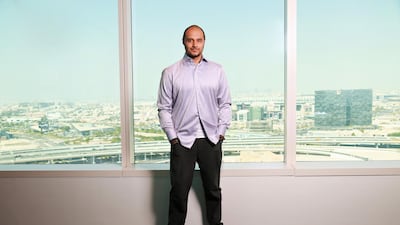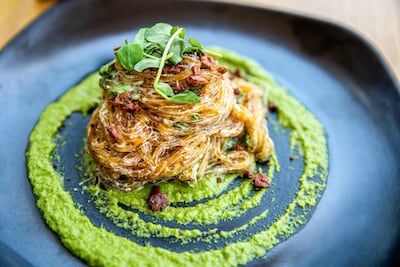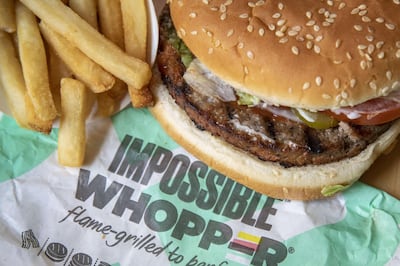When Prince Khaled bin Alwaleed bin Talal Al Saud first decided to go vegan, a domino effect was put in motion. It was 2009 and the plant-based diet was scarcely talked about, even in big cities like London and New York, never mind in the Saudi royal's home city of Riyadh. But, he was overweight, had sky-high cholesterol and knew he needed to do something drastic to achieve a healthy lifestyle.
Fast forward 10 years and Prince Khaled is now one of the biggest and best-known proponents of veganism, not just in the Middle East, but across the planet. Not only has the successful venture capitalist been among the first to financially back some of the world's now most prosperous vegan companies, such as Beyond Meat and Just, he has also managed the unthinkable for many vegans: he convinced his mum and dad to switch to a completely plant-based diet.
Keeping it in the family
“I know, it’s the hardest thing to do, especially with family,” he says with a laugh. We’re talking over the phone as he’s being chauffeured from the airport to his hotel in New York City, where he’s spending the next few days focusing on promoting the Saudi Sports For All Federation, of which the prince, a self-admitted CrossFit enthusiast, was recently announced president. “You see, you have to learn how to play their game. With some parents, you have to plant the seed and just let it go, then let them come up with the idea … like it was theirs all along.”
The way Prince Khaled convinced his father, the businessman and investor Alwaleed bin Talal, was by giving him a copy of Dr Michael Greger's How Not to Die. That was in August 2017, and while it took about seven or eight months, by the next year his dad had fully embraced a plant-based lifestyle, something he maintains to this day. Prince Khaled's mother also follows the diet, and his daughters are showing interest, too. "I'm slowly educating them on the importance of a wholefoods, plant-based diet," he says.
While Prince Khaled turned to veganism for health reasons, his interest has since expanded beyond its nutritional values. “When the discussion moves in the direction of ethics, people automatically gravitate to the cruelty-free reasoning,” he says. “While that is 100 per cent true and I’m behind it, I’d like more people to highlight how much better it is for the environment. If you want to talk about sustainability, a vegan diet is leaps and bounds better than animal agriculture in terms of carbon footprint and the use of resources.”
This is the message he’s been passing on through his work for the past decade, but having these kinds of conversations, particularly with his family, wasn’t easy at first. When he initially went vegan, the reaction was one of shock, not awe. “But that doesn’t change the fact that I know what’s good for me, I know what’s good for the environment,” he says, adding that he quickly became sick of listening to family members joke at dinner about his meal being nothing more than a piece of lettuce and two celery sticks.
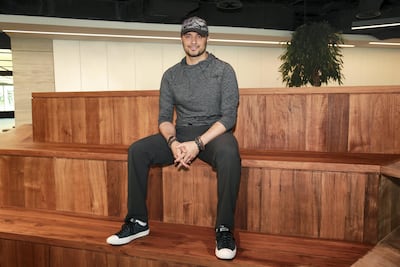
“I think, ‘that’s fine, but I wasn’t at the hospital three weeks ago having a triple by-pass!’ There’s a trade-off at the end of the day … It’s a tough thing to start talking to them about, but when you’re plant-based, it comes with a responsibility – you have to educate people.”
A man on a mission
While chatting to him, it’s immediately clear that Prince Khaled is an open and friendly guy. It’s not exactly what you’d expect from a member of any royal family, not to mention such a busy, jet-setting businessman – he spends most of his time between Riyadh and San Francisco – but it’s a trait he often attributes to his parents, who he says instilled in him the belief that it’s important to connect with people, no matter what level of society they sit on.
“I believe that we all need to think about what kind of people we want to be, and what kind of planet we want,” he says. “Do we act as responsibly as we can towards the Earth? Can we also encourage others to act more responsibly? I try my best, in every way possible, to live mindfully.”
He practises what he preaches, too. For instance, through the Sports For All Federation – which falls under the banner of Global Goals, a joint programme by the United Nations and World Health Organisation, he explains – Prince Khaled actively works to develop Saudi Arabia’s recreational sports landscape, encouraging people in the kingdom to exercise more. This year, the federation also established the Saudi female football team The Greens, which specifically promotes environmental causes from the pitch by orchestrating clean-ups after matches and handing out reusable bags, among other things.
Prince Khaled was also named chairman of the Saudi Humane Society earlier this year, and one of the first things he did was put a plan in place to compassionately tackle the problem of stray animals in Saudi cities. He is also the founder and chairman of KBW Investments, co-founder and vice chairman of property developer Arada and founder and chief executive of KBW Ventures. Through the latter, Prince Khaled puts a significant amount of money into businesses that have benevolent missions. Future Oceans, for example, aims to protect all marine life by developing products like Pingers, which stop dolphins from going near fishing nets. Prolacta Bioscience creates specialist formulas made from human milk for the nutritional needs of premature infants in neonatal intensive care units. Zipline is a drone delivery company that carries vaccines, medicine and blood to rural areas.
Investing in the 'double bottom line'
While these companies fall in line with Prince Khaled’s humanitarian outlook, they also have vast money-making potential, which is what ultimately secures them a place in the KBW Ventures portfolio. “While we love what we call the double bottom line – the potential for profit matched with social impact – [we don’t] specifically seek out companies that are mission driven,” Prince Khaled insists. “We want to do our best, and we want to get in early with companies that are providing alternatives that allow people to do their best. This is what drove us to get in with Memphis Meats – they are a fantastic founding team that is going to really change the options in terms of what people eat.”
Memphis Meats is a Californian company developing a way to produce real meat from animal cells without the need to feed, breed and kill sentient creatures. This is called cellular agriculture, or "clean meat", an industry Prince Khaled believes has a bright future. "We do of course think the potential for returns is through the roof, and that demand will be extremely high for clean meat, especially as people become more and more educated about the pitfalls of the traditional meat industry.
“We do look at things like product-market fit, but we also consider that sometimes a technology is so nascent that it will take years for education levels to catch up with the innovation itself. We’re OK with that, as that’s how some of the household names of technology began.”
He also firmly believes in the financial future of the plant-based protein business. At a recent venture capital event by Bloomberg, he said he believes publicly listed Beyond Meat will do $1 billion (Dh3.6bn) in revenue within the next two years – maybe 10 times that amount by 2029.
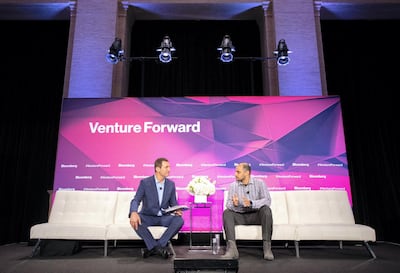
“I do see a future, say by 2030, when plant-based protein will make up 50 to 60 per cent of the protein market. By 2040, I’ll bet you anything it’ll overcome it, simply because the economics are not sustainable any more. The efficiency is not there with the traditional ways of sourcing protein.”
Addressing gaps in the vegan market
Beyond sustainable meat options, Prince Khaled says there is still room in the market for other vegan food businesses. “I think cheeses and seafood both have a way to go,” he admits. “There are good products on the market now, but we still haven’t captured that authentic [mouthfeel] experience.” He’s also partnered up with American celebrity chef Matthew Kenney to create Folia, a menu of high-end plant-based cuisine that is currently available at the Four Seasons Hotel Los Angeles at Beverly Hills and the Four Seasons Bahrain Bay. And it is being introduced at the Four Seasons Resort Dubai at Jumeirah Beach and the Four Seasons DIFC as of November.
“Outside of the food system, I think the next big thing is the revamping of the beauty industry, which is still pretty notorious in its use of animal products, with very little transparency,” Prince Khaled continues. Enter Geltor, a business-to-business research and technology company he has invested in, which is looking to replace animal-based gelatin across the board. Gelatin, often derived from pigs, is currently used in millions of cosmetics sold worldwide, including in the Middle East, where the demand for and awareness of halal beauty products continues to rise. “[It] creates biodesigned ingredients for use in cosmetics that are completely animal-free. One of their ingredients is already in a massively popular Korean product that continues to get really enthusiastic reviews.
"This is a tech company that is able to demonstrate that one ingredient can make a huge difference, to the tune of more than seven million units sold. That is tech at work.”
'A short-sighted viewpoint'
While much of what Prince Khaled is doing within the region is pretty groundbreaking, he doesn’t actually see it that way. “The time has long passed when caring about sustainability was a novel and laudable characteristic,” he says. “It’s more like, if you don’t care about sustainability there’s got to be some type of issue there. Intentionally ignoring solid scientific evidence of the climate crisis is very unusual, and I’m being kind with that description. If you’re a climate crisis denier, and you’re not doing what you can in terms of sustainability and mindful living, then I guess you think you’re above the concerns and obligations of the rest of us.”
And while he’s ready to admit a handful of dogmatic vegans can hurt the movement with their evangelism, the prince says this is a tale of two extremes. “You have the idiots on the other side of it, from the meat industry, who are trying to legally stop plant-based protein companies from calling their products ‘meat’ or non-dairy milk companies calling it ‘milk’.” However, the most surprising criticism of the industry comes from vegans themselves, he adds. “In this case, it is a minority of vegans who criticise the different plant-based products being offered in major food and beverage outlet chains,” he says, citing the example of people getting upset over Burger King cooking vegan burgers on the same grill as meat patties. “That burger is not made for you. That burger is made for everyone else who goes to Burger King on a daily or weekly basis.
“I think this is a short-sighted viewpoint, especially as someone who is vegan. My idea on this is that for every plant-based patty sold in a fast food restaurant, that’s one less meat product sold. So, if people want to split hairs and complain about a shared grill, consider the way worse option: no plant-based burgers at all.”
Some health-conscious diners may argue that’s actually a good thing, considering the rise of the ‘junk food vegan’. While Prince Khaled agrees having a healthy diet is important, it’s also down to the consumer to make educated decisions on what they want to put in their bodies. “It is a choice, but, for me, I’d rather give people the choice rather than not having the alternative ... People can still enjoy their burgers, their shakes, while still being sustainable.”
A domino effect
But giving consumers more options is only one part of the problem, he explains. "I recently read an article in Harvard Business Review that talked about the intention-action gap. Basically, it said that while a big majority of people wanted to purchase products that were advocating for sustainability or created by purpose-driven companies, only around 25 per cent actually did … basically narrowing that gap between the intention to live sustainably and taking the action needed to do so is something that interests me."
Yet, implementing environmentally positive behaviour doesn’t necessarily mean going fully vegan right away, he hastens to add. “It can really be as simple as going for Meatless Mondays or reducing the household’s single-use plastics or not running the water when you brush your teeth.” It starts, he says, with trying to be mindful of your impact every single day.
“There is room for improvement everywhere, not just in the Middle East. Everyone, everywhere needs to live more mindfully. And if that route takes them to a plant-based or reducetarian diet, then even better.” From there, it’s all just one big domino effect.
